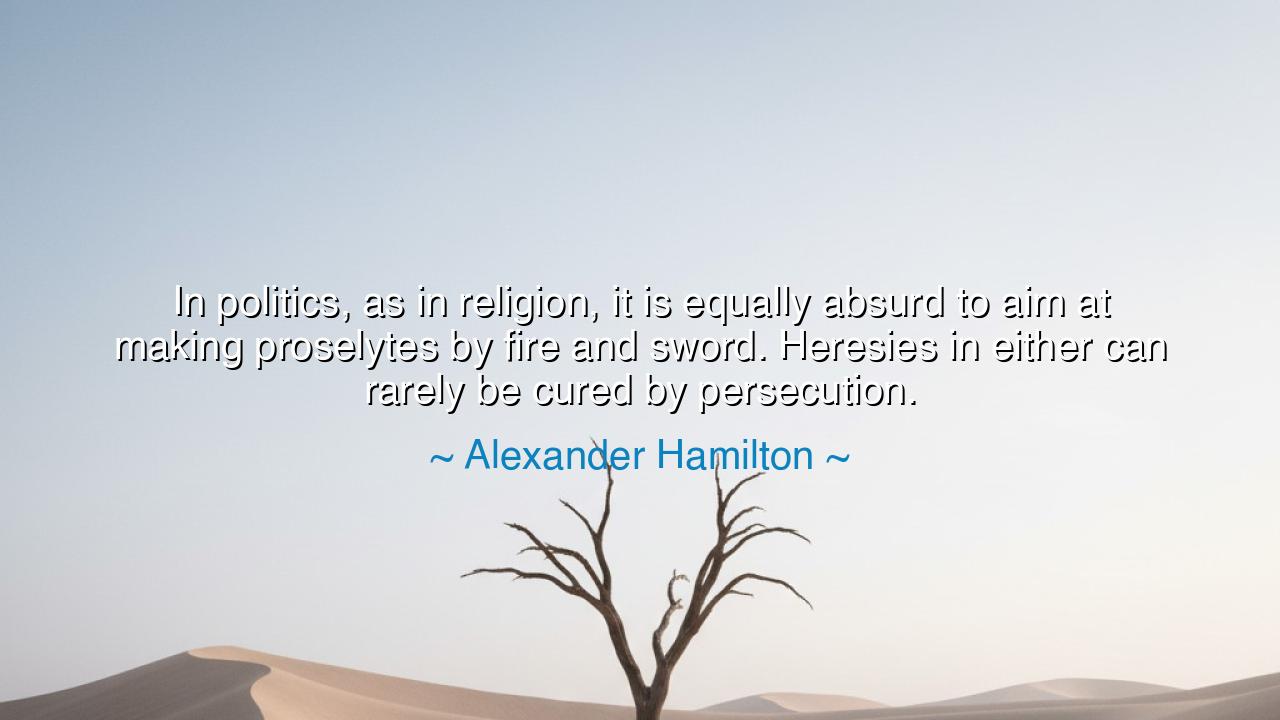
In politics, as in religion, it is equally absurd to aim at
In politics, as in religion, it is equally absurd to aim at making proselytes by fire and sword. Heresies in either can rarely be cured by persecution.






“In politics, as in religion, it is equally absurd to aim at making proselytes by fire and sword. Heresies in either can rarely be cured by persecution.” – Alexander Hamilton
In these piercing and timeless words, Alexander Hamilton, one of the founders of the American republic, speaks with the voice of both a statesman and a philosopher. His insight is as sharp as a blade and as compassionate as a prayer: that neither political belief nor religious faith can be changed through force, fear, or punishment. When he says that “heresies… can rarely be cured by persecution,” he warns humanity that violence may silence tongues, but it cannot convert hearts. Just as faith cannot be birthed by the sword, neither can conviction be imposed by decree. True belief—whether of the soul or of the mind—must arise freely, or it is not belief at all.
The origin of this wisdom lies in the age in which Hamilton lived—an era when nations were being born from the ashes of tyranny, and the modern idea of liberty was still fragile and new. The Founding Fathers of America had studied deeply the lessons of history, especially the blood-soaked centuries of religious wars in Europe—the Inquisition, the Crusades, the burning of heretics, and the persecutions that had driven many to seek refuge in the New World. Hamilton, seeing the same passions that divide men in religion also raging in politics, spoke this truth as a shield against humanity’s oldest folly: the belief that righteousness can be enforced.
In the ancient world, kings and priests alike sought to shape men’s souls by fire and sword. The Romans persecuted Christians, believing that fear would preserve order; the Church later persecuted scientists and reformers, believing that pain could preserve truth. Yet from each act of oppression arose new faiths, new movements, and new ideas that refused to die. Hamilton saw in these cycles the eternal truth that persecution breeds resistance, not unity. To attack a person’s belief is to drive it deeper into their heart, until it becomes not only conviction, but defiance. Thus, he taught that both in the governance of nations and the guidance of souls, coercion is the enemy of wisdom.
Consider the story of Galileo Galilei, the scientist who gazed through his telescope and dared to speak of a universe larger than the Church imagined. For this, he was branded a heretic and made to recant under threat of death. Yet even as he whispered “And yet it moves,” the truth he saw could not be undone. The power of the sword could not erase the power of discovery. In time, the same Church that condemned him would embrace his science. Hamilton’s words mirror this same lesson: that truth, whether political or spiritual, cannot be suppressed by fear—it can only be delayed.
In politics, too, the same pattern unfolds. Revolutions are not prevented by silencing dissent; they are born from it. When rulers seek to crush opposition instead of listening to it, they plant the seeds of rebellion. Hamilton understood that ideas are like fire—they cannot be contained by chains, but only spread more fiercely when the air of persecution fans them. He saw that the health of a republic depends not on uniformity of thought, but on freedom of thought—on the ability of men to disagree, to question, and to reason without fear of punishment. For liberty dies not in chaos, but in conformity enforced by terror.
Hamilton’s warning rings through the centuries because it speaks to the human heart. Whether in the realm of belief or government, the urge to dominate others’ convictions is born of insecurity. The wise man does not seek to convert by violence, but to persuade by virtue. The strong do not demand obedience; they inspire understanding. Hamilton’s vision of political life was not a battlefield of dogmas, but a forum of ideas—a place where reason and dialogue replace persecution and pride.
So, my child of the future, learn from this: when you face those who differ from you—whether in creed or conviction—do not lift your voice in hatred or your hand in anger. Truth cannot be beaten into existence. It must be revealed through patience, compassion, and courage. To seek to rule minds by fear is to destroy the very freedom that gives them worth. Be therefore a builder of bridges, not a wielder of swords. Stand firm in your belief, yet honor the right of others to stand in theirs.
For as Hamilton reminds us, the pursuit of peace and progress demands not persecution, but persuasion—not fire and sword, but heart and understanding. Let this be your lesson and your legacy: that no truth worth believing can ever be born from fear, and no freedom worth having can ever coexist with oppression.






AAdministratorAdministrator
Welcome, honored guests. Please leave a comment, we will respond soon